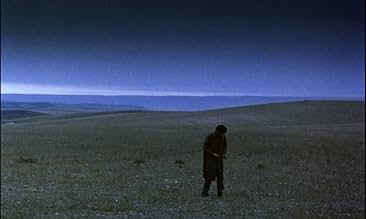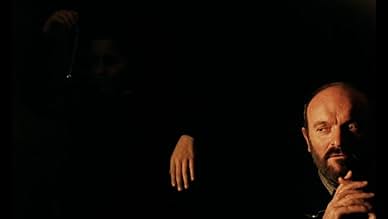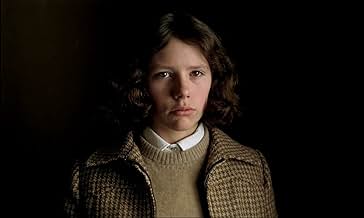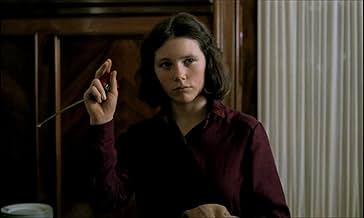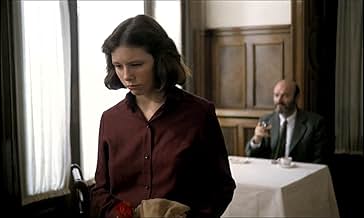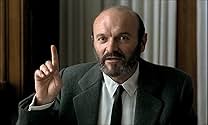AVALIAÇÃO DA IMDb
7,8/10
6,9 mil
SUA AVALIAÇÃO
Uma mulher reflete sobre sua relação de infância com seu pai, tentando compreender a profundidade de seu desespero e a verdade de seus mitos.Uma mulher reflete sobre sua relação de infância com seu pai, tentando compreender a profundidade de seu desespero e a verdade de seus mitos.Uma mulher reflete sobre sua relação de infância com seu pai, tentando compreender a profundidade de seu desespero e a verdade de seus mitos.
- Direção
- Roteiristas
- Artistas
- Prêmios
- 7 vitórias e 2 indicações no total
Aurore Clément
- Irene Ríos
- (as Aurora Clement)
- …
María Massip
- Estrella adulta
- (narração)
José Luis Fernández 'Pirri'
- Carioco
- (narração)
- (não creditado)
José García García Morilla
- Chófer
- (não creditado)
Chus Lampreave
- Casilda
- (não creditado)
Jesús Nieto
- Agustín Arenas- voz
- (não creditado)
- Direção
- Roteiristas
- Elenco e equipe completos
- Produção, bilheteria e muito mais no IMDbPro
Avaliações em destaque
There's no doubt that Erice is one of the best Spanish directors ever, and each film he's made is an absolute masterpiece. I shall not comment anything about the plot, the acting, not even about cinematography. I'm writing this post in order to give IMDb's users a little information which, I think, may solve some questions about this film (why its plot is so "episodic"? why the DVD copy seems a low-quality one? etc): well, actually "El Sur" is an unfinished work! The production was stopped due to money trouble, and Erice wasn't able to complete his film with Estrella's travel to the mythical South named in the title. Many years later, Erice himself explained this film's odyssey in a recorded interview for the Spanish TV.
10zetes
I don't really keep a list of most-wanted-but-unavailable movies, but, if I did, this film, the second of only three features of Victor Erice, director of Spirit of the Beehive, would have been very high on it. It is, to understate, far from a disappointment. Very much a sister film to Spirit, it's about a woman, Estrella, who as a narrator remains off screen, reminiscing about her relationship with her father (Omero Antonutti). As a child (where she is played by Sonsoles Aranguren), she worshiped the man. Behind the perceived god, though, he was quite a sad man, haunted by history. Estrella discovers a particular secret which dominates the man's mind. In her teenage years (where she's played by Iciar Bollain), that secret comes back. This is an achingly gorgeous film, very quiet and largely shot in shadowy, cold sunlight. The images are every bit as gorgeous as Spirit's, and the story is, too. Criterion apparently owns the rights to this. Many of the films that are only streaming on Hulu will never see a home video release, but they really should put this one out there. It's a masterpiece.
A beautiful movie, even if I am not a Spaniard, and the historical perspective doesn't ring too much of a bell.
I would look at the movie as a relationship between a father and a daughter, and there for any father of a daughter (if both are sensitive and a bit introvert / taciturn), it would ring bells.
Father (only mentioned) and Son are on the opposite sides (of civil war, but that is not important), and the antagonism of their espoused cause permeates into their personal relation ship, and the son is thrown out/ moves out.
Wandering around for some time, he finally settles down at a remote place, opposite to his father's (north vs South, Freezing temperature Vs hot weather), with his wife and small daughter. He is the doctor in that small town, and people (and daughter), believe he has mystic powers (he might have).
There are mysteries in his life, some of which his wife knows (probably she knows most), but naturally not the young daughter (she was 8), which makes him more mysterious and interesting for her.
By accident she comes to know that there was another woman in his life (definitely before marriage), whom he had forsaken, but not forgotten. When she is again reminded (she is a starlet, and her one of the movies had been screened on the town), the longing and the memories awake. He is now in a dilemma, one side is his old flame (Irene), on the other, wife and daughter. He hovers on the edge, to abandon which side and jump on to which.
Had the movie been completed, probably I would have known some missing links - the actual story between Laura (screen pseudonym Irene Rios) and Agustin. But even without that it doesn't compromise the plot. It is just that he had been in love, got jealous (probably there was some one else too), and then got married and left the girl and the place. She could be instrumental in that as much as his father was, but that is my guess. In the movie, despite all misunderstandings, the flame burned in him, and another one was of the wife and daughter. Which one to extinguish ? It has a strong angle on the father - daughter relationship and the lack of communication in case of both being introvert - and the ill effects of such relation, especially in crisis. It has a close relationship with many - including the author of Mary Poppins (and her relation with her father). In fact, one could almost say it is P L Travers's biography. At least as much we know of it (except only probably the other woman angle).
Had the movie been completed, probably I would have known some missing links - the actual story between Laura (screen pseudonym Irene Rios) and Agustin. But even without that it doesn't compromise the plot. It is just that he had been in love, got jealous (probably there was some one else too), and then got married and left the girl and the place. She could be instrumental in that as much as his father was, but that is my guess. In the movie, despite all misunderstandings, the flame burned in him, and another one was of the wife and daughter. Which one to extinguish ? It has a strong angle on the father - daughter relationship and the lack of communication in case of both being introvert - and the ill effects of such relation, especially in crisis. It has a close relationship with many - including the author of Mary Poppins (and her relation with her father). In fact, one could almost say it is P L Travers's biography. At least as much we know of it (except only probably the other woman angle).
This story unfolds in delicate time in the history of modern Spain, as well as during a precarious time in the life of a family.
Adolescent Estrella lives in awe of her mysterious and magical father, wonderfully played by Omero Antonutti, and weary of her ever-practical mother and of their isolated life in the misty and brooding northern countryside. Estrella's fascination with her father turns to intrigue- and then to obsession- when she discovers that her father has a secret, and realizes that she is only one facet of her father's life and not the central figure, as he is to her.
After a ray of sunshine is cast into her dark and insular life by the visit of one of her father's aunts (played by the late Rafaela Aparicio in one of her best roles), Estrella yearns to capture more of the essence of her father by one day visiting "el sur" (the south)his home territory.
As Estrella enters the awkward realm of adolescence, she grows apart from her father emotionally. A tragic turn of events condemns him to remain a mythical figure for hersomeone she wonders if she ever knew at all. The supreme irony is that she is very like him.
This film is captivating, both visually and emotionally, and the audience becomes just as absorbed in the story as the characters themselves. It is one of those films whose imagery will always stay in one's memory, such as in the my favorite scene, where father and daughter sit distantly across a table from each other in an old café, listening to the eerie sound of a "pasodoble" that wafts from a wedding in another room, bringing memories of happier, simpler days.
Adolescent Estrella lives in awe of her mysterious and magical father, wonderfully played by Omero Antonutti, and weary of her ever-practical mother and of their isolated life in the misty and brooding northern countryside. Estrella's fascination with her father turns to intrigue- and then to obsession- when she discovers that her father has a secret, and realizes that she is only one facet of her father's life and not the central figure, as he is to her.
After a ray of sunshine is cast into her dark and insular life by the visit of one of her father's aunts (played by the late Rafaela Aparicio in one of her best roles), Estrella yearns to capture more of the essence of her father by one day visiting "el sur" (the south)his home territory.
As Estrella enters the awkward realm of adolescence, she grows apart from her father emotionally. A tragic turn of events condemns him to remain a mythical figure for hersomeone she wonders if she ever knew at all. The supreme irony is that she is very like him.
This film is captivating, both visually and emotionally, and the audience becomes just as absorbed in the story as the characters themselves. It is one of those films whose imagery will always stay in one's memory, such as in the my favorite scene, where father and daughter sit distantly across a table from each other in an old café, listening to the eerie sound of a "pasodoble" that wafts from a wedding in another room, bringing memories of happier, simpler days.
His first film was a lucid, enigmatic and fascinating film entitled "The Spirit of the Beehive", about a young girl in post-Civil War Spain who becomes obsessed with finding the spirit of Frankenstein's monster. His second film, "The South", is nominally about the same things, the delicate and subsequently shattered innocence of childhood, the power of the cinema, and in a more direct yet completely oblique way, the effects that the Spainish Civil War had on that country, as 'the south' becomes to our protagonist this mythic enigma of a place functioning as both heaven and hell, mostly filled in by her father's former nanny's descriptions of the complex situation the war had, and the tossed-off manner in which the stories of the father and his father are delivered are engrossingly enigmatic, theoretically to keep from exposing a closed wound to the young child, but are given in such a vivid shorthand that all the buried truths are there to discover for any discerning viewers older than the protagonist.
The film chronicles a young girl named Estrella who is living in northern Spain who considers her father almost a deity, he is interesting, pleasant and in her eyes, possibly magic, as his enchantment towards mysticism seems to carry on to his daughter. But one day, she discovers a letter by her father where all that is written is a woman's name, over and over, and one night, he disappears for a time, and returns just as suddenly. As she grows older, she decides to follow him on a trip to a local theater, where she discovers the woman's name from the letter on a poster for the film currently playing. After the film, she tracks him down to a local café, where he is composing a letter to the female star of the film, a former lover who he would like to get reacquainted with. He receives a letter back, and soon afterwards, becomes curt, practically silent and emotionally distant, to the point that he seems cut off to the world.
The film's themes towards childhood innocence and lost loves are universal even as they appear bizarrely unique, and although there are a lot of odd details that are left hanging (her prospective admirer, who is a compulsive graffiti artist), they seem to enrich the specifics of this particular situation even as they enhance the general associative qualities of the story around them. The acting, from the Estrellas of both ages (Sonsoles Aranguren at 8, Iciar Bollain at 15) is pitch-perfect, and Omero Antonutti is impeccable, displaying an ability to put forth a wide range of emotions in a very select amount of movements and expressions, and whether he's lovingly essaying a letter to a past lover, or shutting the world out once his reply comes back, you may not always understand his motivations, but you get the sentiment, and you know exactly what he's going for, much in the way that a frowny face means 'sad', except that Antonutti has a range of about three inches on his face with which he brings forth this myriad of emotions.
The film's visuals have a wondrous, hypnotic lyricism to them, from the look to the style to the movement of the camera, something more impressive considering that the film is not all that stylistically obvious, there's nothing that makes you go, "Wow!", but it's there, and you feel it deep down in your soul. It's been too long since I've seen "The Spirit of the Beehive", but I seem to remember this quality being present there as well, and I liken it to the effect of "The Exorcist". There's nothing to make you SCREAM in the exorcist, they're no jump scares, no It Was Just a Cat moments, but the film has such a potent sense of overwhelming DREAD that it just crawls inside your skin and festers, to a glorious extent.
Now, this is not to say the film is without fault. The father's transition from "good dad who has a hang-up about an old relationship" to "full-on shut-in who hates everyone and never speaks to his family again" seemingly takes place within a matter of minutes (and that's FILM LIFE minutes, not just minutes of the movie), and the particulars of his former lover and their relationship are left frustratingly scant, and this doesn't seem like a situation where the act is all that matters, this could have been fleshed out to a more effect breadth, and although I do mostly understand the meaning of the finale, it doesn't make it any less jarringly sudden or unsatisfying. The fact that the film apparently ends only two-thirds of the way into the novel seems to support this conclusion. Also, almost all of the film is presented from the daughter's point of view, but there's several important chunks depicted from the father's perspective that, although informative from an expositional standpoint, seem to sort of reduce the delicate mystery and the effect it would have created had we stayed wholly with the girl.
The film is nowhere near as moving as the minor keys of "Beehive" were, but the film is captivating, engaging and never overstays its welcome (at a svelte 95 minutes), and is most definitely a worthwhile filmgoing experience that is worth hunting down and worth praying for the Criterion treatment for. Thanks, Vic, I can't wait to track down the other 33.3% of your filmography, because so far, you're 2-for-2.
{Grade: 8.25/10 (high B) / #13 of 1983}
The film chronicles a young girl named Estrella who is living in northern Spain who considers her father almost a deity, he is interesting, pleasant and in her eyes, possibly magic, as his enchantment towards mysticism seems to carry on to his daughter. But one day, she discovers a letter by her father where all that is written is a woman's name, over and over, and one night, he disappears for a time, and returns just as suddenly. As she grows older, she decides to follow him on a trip to a local theater, where she discovers the woman's name from the letter on a poster for the film currently playing. After the film, she tracks him down to a local café, where he is composing a letter to the female star of the film, a former lover who he would like to get reacquainted with. He receives a letter back, and soon afterwards, becomes curt, practically silent and emotionally distant, to the point that he seems cut off to the world.
The film's themes towards childhood innocence and lost loves are universal even as they appear bizarrely unique, and although there are a lot of odd details that are left hanging (her prospective admirer, who is a compulsive graffiti artist), they seem to enrich the specifics of this particular situation even as they enhance the general associative qualities of the story around them. The acting, from the Estrellas of both ages (Sonsoles Aranguren at 8, Iciar Bollain at 15) is pitch-perfect, and Omero Antonutti is impeccable, displaying an ability to put forth a wide range of emotions in a very select amount of movements and expressions, and whether he's lovingly essaying a letter to a past lover, or shutting the world out once his reply comes back, you may not always understand his motivations, but you get the sentiment, and you know exactly what he's going for, much in the way that a frowny face means 'sad', except that Antonutti has a range of about three inches on his face with which he brings forth this myriad of emotions.
The film's visuals have a wondrous, hypnotic lyricism to them, from the look to the style to the movement of the camera, something more impressive considering that the film is not all that stylistically obvious, there's nothing that makes you go, "Wow!", but it's there, and you feel it deep down in your soul. It's been too long since I've seen "The Spirit of the Beehive", but I seem to remember this quality being present there as well, and I liken it to the effect of "The Exorcist". There's nothing to make you SCREAM in the exorcist, they're no jump scares, no It Was Just a Cat moments, but the film has such a potent sense of overwhelming DREAD that it just crawls inside your skin and festers, to a glorious extent.
Now, this is not to say the film is without fault. The father's transition from "good dad who has a hang-up about an old relationship" to "full-on shut-in who hates everyone and never speaks to his family again" seemingly takes place within a matter of minutes (and that's FILM LIFE minutes, not just minutes of the movie), and the particulars of his former lover and their relationship are left frustratingly scant, and this doesn't seem like a situation where the act is all that matters, this could have been fleshed out to a more effect breadth, and although I do mostly understand the meaning of the finale, it doesn't make it any less jarringly sudden or unsatisfying. The fact that the film apparently ends only two-thirds of the way into the novel seems to support this conclusion. Also, almost all of the film is presented from the daughter's point of view, but there's several important chunks depicted from the father's perspective that, although informative from an expositional standpoint, seem to sort of reduce the delicate mystery and the effect it would have created had we stayed wholly with the girl.
The film is nowhere near as moving as the minor keys of "Beehive" were, but the film is captivating, engaging and never overstays its welcome (at a svelte 95 minutes), and is most definitely a worthwhile filmgoing experience that is worth hunting down and worth praying for the Criterion treatment for. Thanks, Vic, I can't wait to track down the other 33.3% of your filmography, because so far, you're 2-for-2.
{Grade: 8.25/10 (high B) / #13 of 1983}
Você sabia?
- CuriosidadesDirector Víctor Erice considers this to be an unfinished project. The original script consisted of more than 400 pages and was scheduled to be shot in 81 days. 48 days into shooting, when production was to be moved to the south of Spain, producer Elías Querejeta unexpectedly suspended the project, allegedly because of financing objections by Televisión Española, the backing television network. However, Querejeta revealed years later that he made the decision because he thought the film was complete with what they'd shot so far.
- ConexõesFeatured in Huellas de un espíritu (1998)
- Trilhas sonorasLa puerta del Sagrario
Composed by Enrique Granados
Principais escolhas
Faça login para avaliar e ver a lista de recomendações personalizadas
- How long is El Sur?Fornecido pela Alexa
Detalhes
- Data de lançamento
- Países de origem
- Central de atendimento oficial
- Idioma
- Também conhecido como
- El Sur
- Locações de filme
- Empresas de produção
- Consulte mais créditos da empresa na IMDbPro
Bilheteria
- Faturamento bruto mundial
- US$ 22.720
Contribua para esta página
Sugerir uma alteração ou adicionar conteúdo ausente


